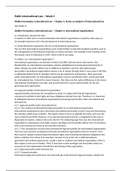Resume
Summary Public International Law - Literature Notes Week 3
- Cours
- Établissement
- Book
Summaries of the readings for Public International Law week 3: - Gleider Hernandez, International Law – Chapter 5, States as subjects of international law; - Gleider Hernandez, International Law – Chapter 6, International Organisations; - Gleider Hernandez, International Law – Chapter 10, Sta...
[Montrer plus]




